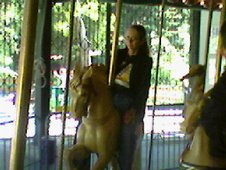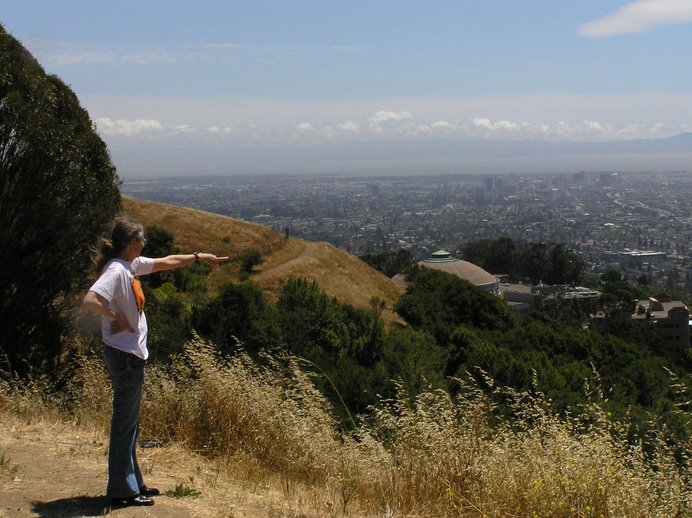













America's citizen-soldiers: My interview with a Marine colonel in Iraq
(Photos are of some of our honorable soldiers in Iraq and Afghanistan including one reading my book, my parents' graves on Memorial Day, a Vietnam war vet and the mysterious sheik in Anbar province)
Good grief, I've done it again. Right in the middle of a very important interview in Iraq, I got brain freeze.
Remember last October when I was granted that exclusive interview with one of the most powerful sheiks in Anbar province but couldn't think of ANYTHING to say? Well, the same thing happened to me the other day when I finally scored an interview with the commanding officer of the Marines' Fifth Regiment, charged with keeping the peace in western Iraq -- and then couldn't think of a single question to ask him.
I coulda asked this colonel all sorts of things -- like questions regarding Marine troop strength in Anbar province, their strategic capabilities and goals, number of insurgent incidents per month, the significance of the six Marines killed in Ramadi recently, how the Marine CAG units' relations with the local city councils were going, how the Iraqi police were doing, if there was any blowback in Anbar after the Basra and Sadr City uprisings, etc.
And on a more personal level I coulda asked the colonel about his own experiences with war, had he served in Bosnia, was he present during the second Battle of Fallugah, what were his own hopes, dreams and aspirations for Iraq, how was he handling being in the unique position of having turned the corner here from fighting for one's life 24/7 to being able to set up a true Marshall Plan and working with the Iraqis as partners in the new Anbar reconstruction movement -- and has he personally ever killed anyone in battle?
Katy Couric herself would have drooled at the thought of being in my shoes! And all I could come up with was, "Er, hi...."
However, the colonel apparently hadn't become a colonel without having learned enough people skills to deal with reporters whose brains had just left the building and it wasn't long before he had put me at ease as he talked about his life as a citizen-soldier in the long-standing and honorable tradition of American citizen-soldiers.
"I was raised on our family's farm in upstate New York," the colonel told me, "getting up at 5 in the morning to do the chores, milk the cows." And then what happened? How did he end up becoming a Marine....
"I come from an Irish immigrant family of farmers and military men. My father and uncles and brothers served in the military and I simply followed their lead, starting out as an enlisted man and then when my tour of duty was up I went on to college under the GI bill, graduated in sociology and then became an officer. That's what I like about the Marines. They don't discriminate against enlisted men moving up in the ranks. If you meet the requirements, you become an officer. And that's that."
I'd heard that said before about the Marines' open promotion system. When I was in Haditha last fall, I'd met a captain who had also worked his way up through the ranks. I'd always intended to write his story but never had time. He was a Puerto Rican who had enlisted as a private and now he was a captain -- or was he a major? I can never figure out what those little tiny patches on the uniforms mean. Maybe he was a colonel too? In any case, he had come up through the ranks, going from the very bottom rung to rather close to the top -- solely based on his abilities.
"So. How's the reconstruction going?" I finally managed to squeak out.
"Let me tell you about reconstruction," said the colonel who I was supposed to be interviewing. "Reconstruction takes money. And money is a coward. It never goes where it's not safe. And now that there is relative safety here in Anbar province, we've been actually able to start putting reconstruction money to work."
Then the colonel looked me straight in the eye. "Make no mistake," he said. "We Marines are the sledgehammer of war. We are killing machines. My regiment, the legendary "Fighting Fifth," was at Guadalcanal and Okinawa. We are warriors and we do what warriors do. But do you know what a warrior's job is?"
"Er, no...."
"A warrior's job is to protect. And that's what we do. We project combat power -- but there is a limit to what combat power can achieve."
"The sledgehammer should only be used when it's needed?"
"Yes."
I guess that this is the message that the Marines in Iraq want to get through to both the Iraqis and the American people -- that the Marines are the fiercest warriors on earth. But they don't just live and die by the sword and if the Iraqis want and need their services as protectors and helpers during times when reconstruction is called for, the Marines can do that too.
I think that what the Marines are now proving here in Anbar -- regarding their ability to create as well as destroy -- is amazing. It certainly has amazed me. They are proving that if the Iraqis are willing to take a chance on the "Fighting Fifth" and lay down their guns, then the Iraqis CAN trust the Marines to not be bullies and barbarian conquerors and Attila-the Huns but rather partners in reconstruction, lending their skills and resources to help rebuild Anbar province and to try to make it whole once again.
The message that the Marines are trying to deliver by their actions here in Anbar is that they are NOT here to torture Iraqis' sons, rape Iraqis' daughters and open more Abu Ghraibs -- and also that, as American citizen-soldiers with a history of service and honor in the finest American tradition, the Marines here can be trusted.
Too bad that this mutual partnership of trust and desire to work toward a mutually beneficial goal isn't taking root in the rest of Iraq.
I have met many other honorable American citizen-soldiers serving in the rest of Iraq -- so perhaps the symbiotic relationship in Anbar could also happen in Baghdad, Basra and Mosul. But it is certainly not happening now, not the way that "Operation Iraqi Freedom" has been conducted by those barbarians and fools in Washington -- Cheney and Bush, men who have not only never been to war but who are not statesmen either and seem to have the ethics of tomcats. Why SHOULD the Iraqis trust them? Heck, we Americans don't trust them either. And I also wouldn't trust John McCain. He lied to me while I was in the Green Zone, about Baghdad being safe. If I had believed him, I woulda gotten my head blown off. Humph.
"But, Jane," you might be saying right now, "are you actually trying to hint that Bush's brutal and bloody occupation of Iraq might actually be a good thing?"
"No. What I am saying is that there ARE honorable men (and women) serving in our armed forces -- high quality people, idealists, warriors and protectors -- who can and will do a good job and CAN be trusted to help the Iraqis carry out an honest and well-considered reconstruction. And I am also saying that this side of the American military is being used and abused by the Shock-and-Awe neo-cons in Washington who have never carried a gun, only like to stir up the pot and do not understand that killing is serious business, not to be taken lightly. But I digress.
Getting back to my interview with the colonel -- I did manage to dream up at least one question. "What about the Marines' stop-loss policy and the back-door draft?"
"The Marines don't do stop-loss. Or stop-move either."
I had been allotted 15 minutes for my interview with the colonel -- and he had graciously granted me an hour and a half of his time. And I had actually managed to get a story out of it too, proving once again how good the Marines are at reconstruction -- they had even reconstructed my brain!

